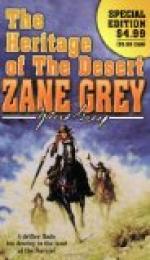“Mescal,” called the Mormon.
A slender girl slipped from one of the covered wagons; she was dark, supple, straight as an Indian.
August Naab dropped to his knees, and, as the members of his family bowed their heads, he extended his hands over them and over the food laid on the ground.
“Lord, we kneel in humble thanksgiving. Bless this food to our use. Strengthen us, guide us, keep us as Thou hast in the past. Bless this stranger within our gates. Help us to help him. Teach us Thy ways, O Lord—Amen.”
Hare found himself flushing and thrilling, found himself unable to control a painful binding in his throat. In forty-eight hours he had learned to hate the Mormons unutterably; here, in the presence of this austere man, he felt that hatred wrenched from his heart, and in its place stirred something warm and living. He was glad, for if he had to die, as he believed, either from the deed of evil men, or from this last struggle of his wasted body, he did not want to die in bitterness. That simple prayer recalled the home he had long since left in Connecticut, and the time when he used to tease his sister and anger his father and hurt his mother while grace was being said at the breakfast-table. Now he was alone in the world, sick and dependent upon the kindness of these strangers. But they were really friends—it was a wonderful thought.
“Mescal, wait on the stranger,” said August Naab, and the girl knelt beside him, tendering meat and drink. His nerveless fingers refused to hold the cup, and she put it to his lips while he drank. Hot coffee revived him; he ate and grew stronger, and readily began to talk when the Mormon asked for his story.
“There isn’t much to tell. My name is Hare. I am twenty-four. My parents are dead. I came West because the doctors said I couldn’t live in the East. At first I got better. But my money gave out and work became a necessity. I tramped from place to place, ending up ill in Salt Lake City. People were kind to me there. Some one got me a job with a big cattle company, and sent me to Marysvale, southward over the bleak plains. It was cold; I was ill when I reached Lund. Before I even knew what my duties were for at Lund I was to begin work—men called me a spy. A fellow named Chance threatened me. An innkeeper led me out the back way, gave me bread and water, and said: ’Take this road to Bane; it’s sixteen miles. If you make it some one’ll give you a lift North.’ I walked all night, and all the next day. Then I wandered on till I dropped here where you found me.”
“You missed the road to Bane,” said Naab. “This is the trail to White Sage. It’s a trail of sand and stone that leaves no tracks, a lucky thing for you. Dene wasn’t in Lund while you were there—else you wouldn’t be here. He hasn’t seen you, and he can’t be certain of your trail. Maybe he rode to Bane, but still we may find a way—”




